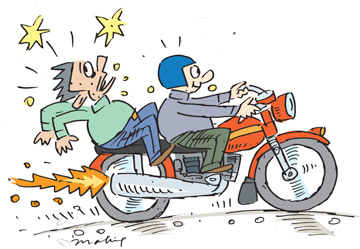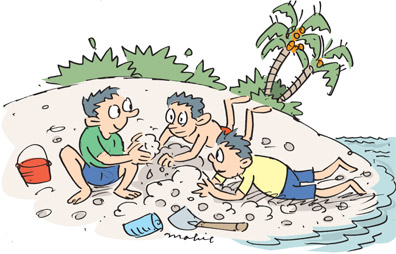|

by R. S. Karunaratne
More on relative clauses
When we use a relative clause to describe the subject on the main
clause, we insert the relative clause after the subject and before the
finite verb of the main clause.
|

My grandfather, whose sight is failing, wears
spectacles. |
The book which is in great demand is out of stock.
The paintings that he did look beautiful.
Jackson, who was a popular singer, died recently.
The curtains which she selected do not appeal to me.
My car, whose tyres I replaced recently, is for sale.
The main clause must have a subject and a finite verb. The finite
verb of the main clause must agree with its subject.
The policeman who arrested the suspect was a new recruit.
The man who spoke rudely to Anne apologised to her.
The children who danced on the stage came from a rural school.
The lady who teaches English is a foreigner.
The river which the village people have polluted will take years to
clean.
When ‘who, which’, or ‘that’ is the object of the finite verb in a
relative clause, we cannot add another object.
The lectures that we had were interesting.
Sri Jayewardenepura which is the capital of Sri Lanka is close to
Colombo.
The books that he writes are interesting.
The girl that you are teaching is my sister.
The gardener who is employed by me is very old.
A defining relative clause identifies the people or things we are
referring to.
The man on whose motorcycle I was pillion-riding was drunk.
Children who are always curious like to walk in the forest.
The pen that he uses seems to be expensive.
The remark that you made just now worries me.
The suspect who planned the robbery was arrested.
A non-defining relative clause does not identify the people or things
we are referring to but only gives more information. We put a comma
before and after the non-defining relative clause.
My grandfather, whose sight is failing, wears spectacles.
Amaradeva, who is in his 80s, can sing beautifully.
Max Perera, who taught us English, was a retired teacher.
The radio, which entertains, can also educate.
The cars, which our country imports, are expensive.
[Activity]
|

The man on whose motorcycle I was pillion-riding was drunk. |
Underline the correct sentences. check your answers with the key.
1. (a) John, who speaks English and Sinhala well, works as a
translator.
(b) John who speaks English and Sinhala well works as a translator.
2. (a) Do you know anyone who speaks French?
(b) Do you know anyone, who speaks French?
3. (a) Kamal works for a company that produces sewing machines.
(b) Kamal who works for a company, that produces sewing machines.
4. (a) Jane, whose car had broken down, was in a bad mood.
(b) Jane whose car had broken down was in a bad mood.
5. (a) My grandson, who lives in Australia, is an engineer.
(b) My grandson who lives in Australia is an engineer.
Key:
1. (a) 2. (a) 3. (a) 4. (a) 5. (a)
What are homophones?
Homophones are words which sound the same but have different meanings
and spellings. Learn the following homophones with their meanings and
enrich your vocabulary.
1. Miner: one who works in a mine
Minor: somebody under legal age
2. Dual: having two parts
Duel: a fight to settle a dispute
3. Levee: a bank or wall to hold a
river back Levy: to order payment
4. Canvas: coarse cloth
Canvass: to visit to get information
5. Desert: to forsake
Dessert: sweet foods eaten after the meal
6. Affect: to influence
Effect: result
7. Council: a group of advisers
Counsel: advice
8. Waive: to give up a claim
Wave: swell of water
9. Colonel: military officer
Kernel: inside part of a nut
10. Cymbal: musical brass plate
Symbol: something that stands for another thing
11. Callous: unfeeling
Callus: thick place on the skin
12. Principal: school head
Principle: a basic truth
13. Complement: something that completes
Compliment: something good said about somebody
14. Stationary : not moving
Stationery: writing material
15. Bow: bend at the waist
Bow: a weapon
Starters:
How to use prepositions
Part 18
There are over 100 prepositions in English. This is a very small
number compared with the vast number of nouns, verbs and adjectives we
use. However, most beginners find it difficult to use prepositions
correctly.
Here is a guide.
On
If you are on a committee, you are a member of it.
Dudley is on the Executive Committee of the Tax Payers’ Association.
If something is on a list, it is included in it.
Passing the examination is on my list of important objectives.
Your lecture on “Democracy in Sri Lanka” is on the agenda.
We use ‘on’ to indicate that somebody is doing something.
When she died I was on a trip to India.
I met an old friend on my recent visit to London.
The following verbs are usually followed by ‘on.’
base, bestow, blame, confer, foist, force, impose, inflict, lavish,
model, spend, bet, build, capitalise, check, choke, concentrate, count,
depend, eavesdrop, economize, embark, encroach, focus, frown, gamble,
hinge, impinge, impose, improve, infringe, insist, intrude, lean, pivot,
plan, prevail, rely, save, settle, verge.
Similarly, the following nouns are followed by ‘on.’
assault, attack, attempt, ban, boycott, burden, claim, constraint,
effect, embargo, emphasis, focus, infringement, limit, limitation,
moratorium, onslaught, restriction, sanctity
|

The children fell onto a heap of sand. |
When you say you are working on a book, you mean that you are writing
it.
Sometimes, we congratulate somebody on something.
The minister congratulated the team on its victory.
The teacher complimented me on my essay.
If you stumble on something, you discover it.
When I was in Malaysia I stumbled on an ancient ola leaf.
On account of
When we use ‘on account of’ something, we give the reason.
Some pilgrims were harassed in Chennai on account of their nationality.
On board
When we are on board a bus, train, aircraft or ship, we are on it or
in it.
He came on board a luxury ship to impress his relatives.
Onto
If somebody or something moves on to an object, the object supports
them.
The children fell onto a heap of sand.
In a rage, he threw a bottle onto the floor.
We get onto a bus or train to go somewhere.
We got onto Ruhunu Kumari to reach Matara.
When you hold onto something, you hold it firmly.
We held on to the railing without knowing what would happen to us.
While speaking we can move onto a different subject.
The speaker moved on to the next topic abruptly.
[Activity]
Fill in the blanks with suitable prepositions. Check your answers
with the key.
1. She looked ............. and saw a helicopter.
2. There are some cups and saucers .......... the table.
3. Prince Charles did not become king of England ........... 1999.
4. Did you go .......... plane?
5. Sumo wrestlers train ........... six hours a day.
6. Is there an opera house .......... Sydney, Australia?
7. Is there a bus .......... the airport?
8. Laura listens ......... music while cooking.
9. Smith is at the police station ............ a fire in his house.
10. In a normal life we sleep ............ 25 years.
Key:
1. up 2. on 3. in 4. by 5. for 6. in 7. to 8. to 9. after 10. for
Form adjectives from nouns
Words often come in families. You can expand your vocabulary by
becoming familiar with these word families.
Write the relevant adjectives in column ‘B’ for the nouns found in
column ‘A’.
The first one has been done for you. Check your answers with they key.
Column A Column B
1. Keenness keen
2. Keeping .............
3. Kindness .............
4. Knowledge .............
5. Laughter .............
6. Law .............
7. Laziness .............
8. Leader ............
9. Learning .............
10. Legality .............
11. Length .............
12. Lie .............
13. Life .............
14. Lightness .............
15. Liking .............
16. Likelihood .............
17. Limit .............
18. Literature .............
19. Liveliness .............
20. Location .............
21. Loss .............
22. Love .............
23. Low .............
24. Luck .............
25. Mechanism .............
Key:
2. kept
3. kind
4. known
5. laughable
6. lawful
7. lazy
8. leading
9. learned
10. legal
11. lengthy
12. lying
13. lifeless
14. light
15. likeable
16. likely
17. limited
18. literary
19. live
20. local
21. lost
22. lovable
23. lowly
24. lucky
25. mechanical |


